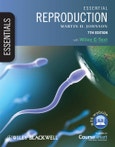Providing essential reading for medical, veterinary and biological science students, and students of physiology and trainees in obstetrics and gynaecology, the seventh edition of Essential Reproduction offers an up-to-date account of the fundamentals of reproduction within the context of cutting-edge knowledge and examples of its application. It provides a multidisciplinary approach integrating physiology, genetics, behaviour, anatomy and clinical science, to give thorough coverage of the study of mammalian reproduction.
Essential Reproduction is now accompanied by the Wiley E-Text: Powered by VitalSource, and includes:
- The latest on conceptual, informational and applied aspects of reproduction
- A new structure offering a more logical approach to study and revision
- Expanded further reading suggestions to support research
A companion website at
Table of Contents
Preface vii
How to use this book viii
Acknowledgements ix
Features of your textbook x
PART 1: Introduction 1
1 What is reproduction? 3
PART 2: Making men and women 33
2 Sex 35
3 Sexual maturation 50
4 Gender 69
5 Sexual selection 85
PART 3: Preparing for pregnancy 103
6 Making sperm 105
7 Men 122
8 Making eggs 133
9 Women 151
PART 4: Making an embryo 173
10 Sperm and eggs 175
11 Fertilization 189
12 Initiating pregnancy 206
PART 5: Maintaining a pregnancy 225
13 Supporting the embryo and fetus 227
14 Growing the fetus 245
15 Fetal challenges 258
PART 6: A new individual 271
16 Preparing for birth 273
17 Giving birth 283
18 Lactation 297
19 Postnatal care 309
PART 7: Manipulating reproduction 323
20 Regulating fertility 325
21 Restoring fertility 340
22 Society and reproduction 356
Index 365
Reviews
Although professionals at all levels may derive some benefit from this book, the ease of reading and the accompanying online versions may benefit students the most. The illustrations are wonderful and the content solid with a decidedly European feel. (Doody s, 7 June 2013)
Essential Reproduction is the recommended text for students studying the reproduction course and my go–to guide when preparing material to cover during supervisions. It explains the key principles of the subject as well as reviewing the scientific evidence in an approachable way. The 7th edition has been updated and the contents broken down into shorter chapters – making navigation through the book more manageable. I noticed that some topics that are common "problem areas" for students have also been restructured. A particularly useful feature is the e–text feature of the book purchase, which enables me to access the text on my iPad so I can always have it handy for quick reference. Overall, it′s difficult to bring this book′s substance to fault – a very minor quibble is that the book′s 7th Ed facelift has resulted in every chapter title being illustrated by the image of fertilisation whereas it would have been nice to see an images more relevant to context of the chapters in question. In a future edition, "self–test" questions or stimuli for further discussion/essay writing would be a welcome stylistic addition. (Stephanie Smith, University of Cambridge)








